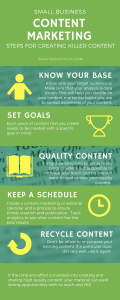It’s that time of year again, and we don’t just mean the season of white-bearded men in red suits or going back for second helpings of holiday ham.
It’s also prediction season, and forecasters are prophesying everything from the next presidential election and football championship matchups to interest rates and gas prices. Of course, when it comes to business, forecasting is vital.
As you’re preparing your 2016 marketing plan, here are some predictions for what the top trends will be in the New Year — and what these trends could mean for your small business.
SEARCH

Search Engines Will Get Some New Competition. If it seems like Google, Yahoo and Bing have been in the driver’s seat of search results forever, it’s because they have. Back in 2012, Google admitted to fielding 1 trillion searches per day and earlier this year company executives said that number is even higher now (big surprise). But the big search engines will be getting some additional competition in 2016, courtesy of social media.
Social networks like Facebook and Pinterest are either expanding their search capabilities or getting ready to do so. What’s more, Google indexes public tweets on Twitter. That’s good news if your small business has been making good use of social media marketing already, and bad news if you haven’t.
Social media has become the word of mouth by which small businesses can live or die. If your small business has amassed positive reviews and feedback on social networks, in 2016 potential customers may be able to find you — and all those positive reviews — with a search on their favorite social media sites. Conversely, if you’ve been lax about social media marketing, or worse, have negative reviews crowding cyberspace, social network search capabilities won’t help your overall marketing efforts.
Consumer use of social media continues to grow. People already have the ability to make purchases, talk about what they bought, and comment on the seller through social media. Adding search capability seems like a no-brainer.
MOBILE

Mobile’s just getting bigger. Ride a train or bus, sit in an airport or restaurant and it’s impossible to miss — mobile devices are everywhere. In fact, the saturation of mobile is astounding, and it’s still growing. Witness the stats:
- In 2014, 2.1 billion consumers owned smartphones worldwide, according to the Internet Trends 2015 report.
- Mobile use now accounts for more than half of the total time people spend on digital devices, the report states.
- Eighty percent of Internet searches are conducted on smartphones, according to data from the Global Web Index.
- Sixty-six percent of all email in the U.S. is now read on smartphones, according to the US Consumer Device Preference Report from MovableInk.
- In 2015, mobile Internet traffic surpassed desktop traffic, according to Google.
What does all this mean for your small business? It’s vital that your website is mobile responsive and that you offer a mobile app to allow customers to easily access your products and services from their favorite mobile devices. Your email marketing campaigns must also be mobile-friendly. Remember, mobile users are working with a smaller screen when they access your marketing emails, so it’s important that each email you send is concise, simple and easy to read.
VIDEO

Video will continue to be worth a thousand words … or more! Consumption of online videos has been steadily increasing for years, and the rise in mobile usage is further fueling that growth. From a marketing standpoint, video is a powerful tool. A video shared on social networks or your website can allow viewers to actually see what your product looks like and how it performs. It can also foster interaction between your business and customers by allowing them to post questions and comments on your video.
The exciting development for 2016 could be that search engines will begin incorporating video ads into search results. Some of the largest search engines are reportedly testing the idea of video ad search results. It seems more likely that indexing of video ads is a question of when, rather than if. When it comes to fruition, small businesses that have been leveraging video will be ahead of competitors who are still stuck in text land.
APPS

App indexing will mean more apps and more opportunities. Multiple studies point to the idea that apps will one day soon overtake mobile-responsive websites for the preferred method of interaction between mobile users and brands. The advantage of apps for users is easy to see. Apps have all the functionality of mobile-friendly websites, but they streamline user access. App users don’t have to type a search into a browser to begin interacting with a brand.
Google already indexes apps. If it happens to index yours, when your app appears in Google search results, users automatically see an install prompt for the app. So, not only does app indexing improve visibility, it potentially increases the number of mobile users who actually download and use your app.
AUTOMATION

Marketing automation will make your budget more effective. One of the greatest strengths of email automation tools has always been the amount of time it frees up for marketers. Such tools allow users to spend less time (and money) on “grunt work” like creating and distributing emails, and more on creating quality, engaging content to go in those emails. Marketing automation extends that benefit to your whole marketing program.
Marketing and email automation makes it easier to create and schedule emails, segment mailing lists, automate social media posting, track open and response rates, and even calculate conversions. For small businesses whose marketing departments are often just one or two people, automation can allow them to achieve more without increasing budgets.
CONTENT

Content will continue to be king. Virtually everything you do online qualifies as content marketing if it’s done with the goal of providing information to and building trust with current and prospective customers. Americans’ appetite for useful, engaging and entertaining content continues to grow. Consumers consistently respond to content that provides them with “news they can use,” informative entertainment and value, but they aren’t the only ones who demand quality content. Search engine algorithms are designed to hold marketers to a higher standard of quality, rewarding top notch content with higher positioning in search results.
Increasingly, consumers want customized content that’s tailored to meet their specific interests, needs, and tastes. In fact, 90 percent of Americans find custom content useful, and custom content makes 78 percent of consumers feel that the organization providing it cares about building a good relationship with them, according to the CMO Council.
As you make your content marketing plans for 2016, keep in mind the benchmarks of quality and customization.
PERSONALIZATION

Fully personalized email marketing: Its time has come. Technology has made it more feasible than ever for marketers to produce fully customized content, including emails — and consumers know this. Their expectation of customized content is high, and consumers whose expectations are met will be more inclined to respond positively to marketing material. The preference for customization is driving the dip in efficacy of batch and blast email campaigns.
In fact, according to the Email Marketing Industry Census, 78 percent of the marketers surveyed predicted that by 2020 all email communication will be personalized. Right now, one in three companies are already doing this, the census found, and 37 percent intended to begin doing it in the immediate future. Your small business can get ahead of the curve and begin customizing emails right away.
POP-UPS

Pop-ups with purpose: Growing your email lists. “Lightbox pop-ups” are the windows that appear on a website when you’ve been on it for a certain amount of time, or when you hover your mouse icon over a specific portion of the site, such as the browser bar. Popular wisdom might make you think that pop-ups are most likely to elicit annoyance from online users, but the data says otherwise. While they may be annoying when they’re nothing more than a straight sell, studies show that lightboxes can be an effective way to solicit email addresses from web users.
They work for multiple reasons. First, consider timing. If a user is already on the way to leaving your page (often the case when their mouse button makes it to the browser address line), what do you have to lose by stalling them a few seconds more with a pop-up that asks them to enter their email address? Lightboxes also offer a measure of convenience; consumers who go to your website looking for the opportunity to sign up to receive emails about deals and specials will easily find where to type in their information. Too often, email sign-up buttons are tucked away in unobtrusive corners of the page, but a lightbox puts it front and center.
Conclusion: By now, you’ve probably noticed a pattern to these trends — they are driven by online behaviors. Digital marketing is not only the wave of the future; it’s how business is getting done right now. Your small business can lay the groundwork for continued growth in 2016 by leveraging these digital marketing trends to create consumer interest and loyalty to your brand, products, and services.
Business & Finance Articles on Business 2 Community(45)
Report Post





